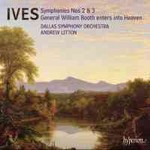
Symphonies - Volume 1 (Nos 2 & 3)
 $30.00
Out of Stock
$30.00
Out of Stock6+ weeks add to cart
CHARLES IVES
Symphonies - Volume 1 (Nos 2 & 3)
Dallas Symphony Orchestra / Andrew Litton
[ Hyperion / CD ]
Release Date: Thursday 12 July 2007
This item is currently out of stock. It may take 6 or more weeks to obtain from when you place your order as this is a specialist product.
"So, an excellent pair of discs, well filled and beautifully recorded"
(MusicWeb Oct 2006)
"Charles Ives' first three symphonies - the First begun in 1898 when he was still a student at Yale, the Second and Third following over the next six years - chart a steady musical progress from unexceptional Brahmsian classicism to a more exuberant, quintessentially American idiom. But nothing in those works prepares the listener for the Fourth Symphony, which Ives worked on from 1912 until the mid-1920s. It represents a leap into the unknown, into a musical world without safety nets and mostly lacking the gravitational pull of tonality. Ives' personal brand of modernism was concerned only incidentally with the hierarchies of harmony that so obsessed Schoenberg, and not at all with the emancipation of rhythm that Stravinsky promoted. His vision was one of inclusiveness, which made no distinction between high art and the vernacular; between what is familiar, sometimes banal, and what can be very strange indeed. The Fourth Symphony communicates that vision more powerfully than Ives' other works; it is his masterpiece, a landmark in 20th-century music. Although it was not performed complete until 1954, any performance still packs a disquieting power. The performance of the Fourth is rightly the pinnacle of Andrew Litton's superb Ives cycle, recorded live over the past three years at concerts in Dallas. Litton has the work's measure perfectly, balancing the visionary with the prosaic, and teasing out the most complex textures of a huge orchestra and a chorus with an exemplary clarity that is flawlessly captured by the recording. His performance of the Second is almost as impressive. It's a fascinatingly transitional piece, still stylistically in hock to the European late romantic tradition - there are regular echoes of Dvorak's New World Symphony - but also plundering the stock of American folk songs that are woven into the textures with gleeful abandon. Litton makes it hugely successful on its own terms, but it's the disc containing the Fourth that's the compulsory purchase. It also includes a wonderfully atmospheric account of the impressionist study Central Park in the Dark, which is quintessential Ives, too."
5 stars GUARDIAN.CO.UK
This pair of exciting discs from the Dallas Symphony Orchestra and Andrew Litton offers thilling new recordings of all four of Charles Ives's extraordinary symphonies. The idiosyncratic nature of Ives's early musical training (simultaneous but competing marching bands, etc) is well known, but before we can delight in its fruits, we find Ives-the-student writing a (relatively) conventional Symphony No 1 under the watchful, if not always approving, stare of his tutor. The result is almost a pastiche of all that we know and love from the late-nineteenth century symphonic tradition: Brahms, Dvorvák, Tchaikovsky. Released from college in 1898, Ives rapidly shook off such influences, entered a new century and set about expanding his extraordinary vision through three further symphonies, culminating in the spiritual marathon of the fourth, which- Ives tells us-poses (and answers, threefold) the cosmic questions 'what?' and 'why?'. Alongside the four symphonies we have Central Park in the Dark, and an Ives-sanctioned orchestral arrangement of his most popular (and outrageous) solo song, General William Booth Enters into Heaven. The commanding baritone of Donnie Ray Albert tells the story of General Booth-founder of the Salvation Army-approaching the pearly gates, the great unwashed in his following (Dallas Symphony Chorus) assured of being 'washed in the blood of the Lamb': Hallelujah! Captured live during concerts in Dallas, the recorded sound is every bit worthy of these epic works. Both discs are available in conventional CD format as well as DSD multichannel hybrid SACD.
Tracks:
Symphony No 2
Symphony No 3 'The Camp Meeting'
General William Booth enters into Heaven
